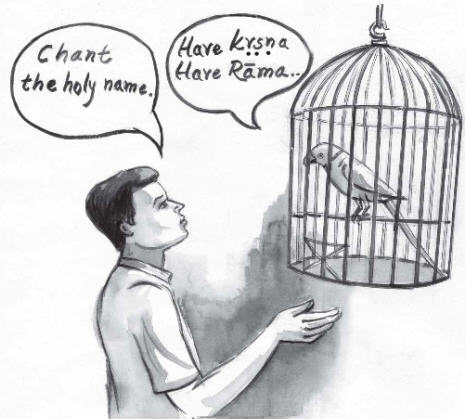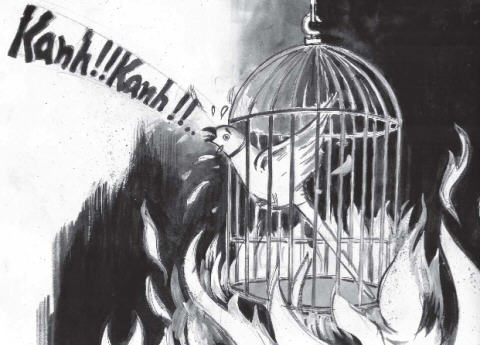A sadhaka’s struggle to overcome mechanical chanting and become attentive.

Many of us chant Hare Krishna like parrots. Yes, we do!
Parrotlike chanting neither transforms the heart nor helps when we need it most at the most crucial time of death, when we want to remember Krishna most.
Chanting Krishna’s holy names attentively is therefore one of the fundamental practices of every person trying to attain Krishna consciousness. Chanting Hare Krishna attentively, seriously, and sincerely, will allow us to remember Krishna at the time of death, and that will allow us to free ourselves from the vicious cycle of birth and death.
Unfortunately, for most practicing devotees attentive chanting is a struggle. Distracted by all kinds of mundane thoughts and objects while we chant, we constantly lose our focus on the divine sound. Our chanting then becomes a monotonous drone. Although our lips are moving, our mind remains totally absorbed in thoughts unrelated to the sounds the lips are forming.
Srila Prabhupada compared such chanting to the chanting of parrots. He said, “The parrot also imitates chanting. But when the cat catches [its neck], he does not say Hare Krishna. He says ‘Kanh! Kanh!’. . . We should be accustomed to chant Hare Krishna whenever the death point is there. Then that is success.” (Lecture on The Nectar of Devotion, Vrindavana, November 14, 1972)
Let us understand these points deeply with the help of three parrot anecdotes.
Shallow Chanters
There was once a king who was fond of parrots, and he appointed trainers to teach his parrots to chant the holy names of God. Seeing them chanting so obediently, he felt proud, and sometimes challenged his court minister, “You keep philosophizing that only humans can chant the names of the Lord. Look at my parrots they can chant better than people.” But the minister was wise and didn’t agree with the king. One day he decided to prove his point.
He spread hay around the parrots’ cage and lit it. As the fire ignited the parrots began to squawk in fear. Upon seeing his parrots so terrified the king shouted, “Why are you trying to kill my parrots?” His minister coolly replied, “O King, did you not hear what these parrots were chanting in the face of death? None of them chanted the holy names of God you have so painstakingly taught them. This proves that mechanical, parrotlike chanting doesn’t actually award us the true benefit of the holy names. When the holy names are chanted with love and devotion, only then can we attract the mercy of the Lord. The real test of our devotion and surrender is our being able to call out to God at the time of death.” The king admitted his mistake and thanked his minister for enlightening him.
Callous Chanters

A parrot seller had taught his parrot to chant the Lord’s holy name. If someone pulled the parrot’s right leg, it would chant Hare Krishna; if someone tugged on the left, it would chant Hare Rama. This special parrot attracted a large crowd and became famous. The parrot seller then managed to sell the parrot at a good price to a rich man who was amused by its skill. He hoped to entertain his guests with it.
But soon the man wondered, “Instead of pulling one leg at a time, if I pull both together, the parrot will chant the whole maha-mantra. Wouldn’t that be nice?” So one evening the man brought out the parrot in front of his distinguished guests and pulled both its legs. The parrot squawked, “You rascal, don’t you understand that if you pull both my legs at once I’ll fall down?”
The parrot’s temper did not display any trace of spiritual evolution. It’s important that we understand the process of chanting and the meaning of the prayer. Chanting the holy names in order to impress or entertain others will not bring us spiritual benefit. Srila Prabhupada taught us how to pray while chanting Hare Krishna: “O my Lord, O energy of the Lord, please engage me in Your service.”
Motivated Chanters
Once there was a priest who kept two male parrots in his house. Both these parrots would imitate the priest by reciting whatever mantras and prayers he was chanting while he performed his daily worship. Across the street lived another priest with two female parrots. Both these parrots spoke rubbish. Both sets of parrots could see one another from their respective windows.
Being a kindhearted man, the second priest thought, “Those male parrots are pious and always chant the names of God. If my female parrots associate with them, they too will learn to chant the holy names.” So he carried his two parrots over and put them inside the cage with the two male parrots. As soon as the female parrots arrived, one male parrot said to the other, “Stop chanting now our prayers have been answered!”
We must remember that nothing material can give us lasting happiness or peace of mind. The pure spirit soul within us, which is a fragment of the Lord’s spiritual energy, craves for spiritual bliss in association with the Lord. To maintain material attachments while chanting the holy names of Krishna is considered an offense to the holy name. One should have no desire except the hope to serve the Lord, as Lord Caitanya Mahaprabhu teaches:
na dhanam na janam na sundarim
kavitam va jagad-isa kamaye
mama janmani janmanisvare
bhavatad bhaktir ahaituki tvayi
Cc. Antya 20.29, Siksastaka 4
“O Almighty Lord, I have no desire to accumulate wealth, nor to enjoy beautiful women. Nor do I want any number of followers. All that I want is the causeless mercy of Your devotional service, birth after birth.”
Unlike parrots, devotees do everything faithfully and with attention. They apply their intelligence to understanding and assimilating the devotional process and perform devotional service with all their heart. Srila Prabhupada used to warn the devotees to avoid offenses while chanting japa. He writes, “Offenseless chanting of the holy name of the Lord is transcendental, and, therefore, such chanting can at once purify one from the effects of all kinds of previous sins. This offenseless chanting indicates that one has fully understood the transcendental nature of the holy name and has thus surrendered unto the Lord.” (Bhagavatam 1.18.19, purport)
When to Act Like a Parrot
That said, devotees choose to act like parrots when transmitting the message of Krishna and guru. When they try to educate others about Krishna, they do not manufacture their own theories but repeat the message as it is, without adulteration or modification. Srila Krishnadasa Kaviraja Gosvami, the author of Sri Caitanya-caritamrta, says that his work was not his own writing but the dictation of Sri Madana-mohana, Lord Krishna. “My writing,” he said, “is like the repetition of a parrot.”
But in all other forms of chanting, we should take care not to behave like unintelligent parrots. King Kulashekhara prayed, “How will it be possible for me to remember You at the time of death, when my throat will be choked up with mucus, bile, and air?” While we have health we have to develop love for the holy name. If we don’t chant with affection, love for Krishna and His holy name will not develop in our hearts.
While chanting we have to try harder to overcome our parrotlike tendencies. Let our mind seek love in Krishna’s holy name as a swan seeks pleasure in digging into the lotus flowers. Maharaja Kulashekhara prays, “My dear Lord, just now I am quite healthy, and it is better that I die immediately so that the swan of my mind can seek entrance at the stem of Your lotus feet.”
Making a sincere effort means letting go of our worries and dreams and submitting ourselves to hearing the mantra. To confide in Krishna and abandon ourselves to Him with eyes wide open is our only hope. Krishna will reciprocate such willing surrender. On realizing Krishna’s presence, at once our hearts are overwhelmed with love and devotion, to be savored by the swan of our mind.
Yugavatara Dasa is an associate professor in Anatomy in a medical college in Mumbai. He is a regular contributor to BTG.
